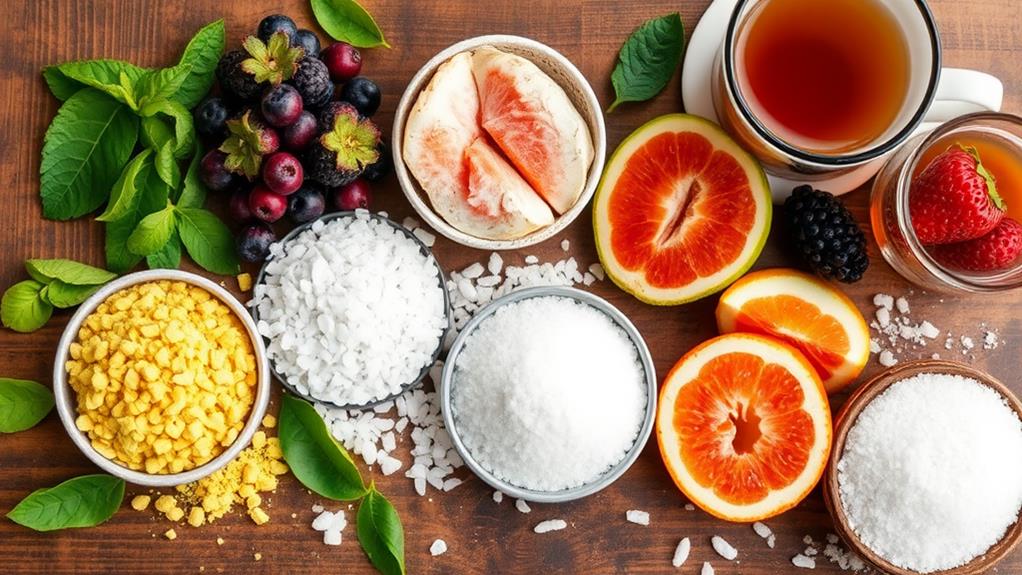You'll find a sweet solution to your health goals with these top sugar substitutes for 2024. Lakanto Classic Monk Fruit Sweetener offers a zero-calorie, keto-friendly option, while Stevia In The Raw provides a plant-based alternative in convenient packets. My Normal Keto Allulose Sweetener blends multiple natural sweeteners for a clean taste. SPLENDA Zero Calorie Sweetener remains a popular choice for its sugar-like flavor. WHOLE EARTH Erythritol Sugar Alternative caters to low-carb dieters with its versatile cooking properties. When choosing, consider factors like calorie count, glycemic impact, and cooking versatility. Discover how these options can satisfy your sweet tooth without compromising your wellness journey.
Key Takeaways
- Monk fruit sweeteners offer zero calories and a natural, sugar-like taste without aftertaste, suitable for various diets.
- Stevia provides a plant-based, zero-calorie option that's versatile for beverages and baking without bitter flavors.
- Allulose blends, like those with monk fruit, offer prebiotic benefits and clean sweetness without impacting blood sugar.
- Erythritol mimics sugar's taste and texture, making it ideal for cooking and baking with minimal digestive impact.
- Natural sweeteners like monk fruit and stevia are preferred over artificial options for their clean label and health benefits.
Lakanto Classic Monk Fruit Sweetener (Zero Calorie, Keto Friendly)
For those seeking a sugar substitute that closely mimics the taste and versatility of regular sugar, Lakanto Classic Monk Fruit Sweetener is an excellent choice. This zero-calorie, keto-friendly sweetener blends monk fruit and erythritol to create a 1:1 sugar replacement. It's ideal for various diets, including ketogenic, diabetic, and paleo, with zero net carbs and no glycemic impact.
You'll find Lakanto Classic dissolves well in beverages and enhances flavors without overpowering them. It's perfect for baking, producing delicious cookies and treats. Use it in coffee, smoothies, and recipes without worrying about an aftertaste. The resealable bag and included scoop make measuring easy. While it's pricier than regular sugar and may cause digestive issues in large quantities, many users recommend it as a healthier alternative for satisfying your sweet tooth.
Best For: Health-conscious individuals, diabetics, and those following ketogenic or low-carb diets who want a natural, zero-calorie sugar substitute that tastes similar to regular sugar.
Pros:
- Zero calories and net carbs, with no glycemic impact
- Versatile for use in cooking, baking, and beverages
- Natural ingredients without artificial sweeteners or aftertaste
Cons:
- More expensive than regular sugar
- May cause digestive issues if consumed in large quantities
- Some users may find the taste slightly different from sugar
Stevia In The Raw Zero Calorie Sugar Substitute (200 Count Packets)
Health-conscious individuals and those managing their sugar intake will find Stevia In The Raw Zero Calorie Sugar Substitute an excellent choice. This plant-based sweetener, extracted from stevia leaves, offers a zero-calorie alternative to refined sugar. It's USDA Organic, Non-GMO Project Verified, vegan, and gluten-free, making it suitable for various dietary needs.
You'll appreciate its versatility in hot and cold beverages, cooking, and baking. Many users report a pleasant taste without a bitter aftertaste, though it's essential to recognize that it's sweeter than sugar, so you'll need less. The 200-count packet format provides convenience for daily use, whether you're sweetening your morning coffee or preparing a healthy dessert. While some customers find it a great value, others expected larger quantities. Overall, Stevia In The Raw offers a natural, healthier way to satisfy your sweet tooth without compromising on taste.
Best For: Health-conscious individuals, diabetics, and those looking to reduce sugar intake while still enjoying sweet flavors in their food and beverages.
Pros:
- Zero-calorie, natural sweetener that doesn't affect blood sugar levels
- Versatile for use in hot and cold beverages, cooking, and baking
- USDA Organic, Non-GMO Project Verified, vegan, and gluten-free
Cons:
- Some users may find it overly sweet compared to sugar, requiring careful measurement
- Pricing feedback varies, with some customers expecting larger quantities
- May have a slight taste difference compared to regular sugar that not all users enjoy
My Normal Keto Allulose Sweetener (17.1 Fl Oz)
Individuals seeking a versatile, keto-friendly sweetener will find My Normal Keto Allulose Sweetener an excellent choice. This 17.1 Fl Oz blend of allulose, monk fruit, and stevia offers a 1:1 sugar substitute with zero calories and net carbs, making it ideal for keto, paleo, and vegan diets. You'll enjoy its clean, mild sweetness without an aftertaste, and it's perfect for baking, cooking, and various recipes.
You'll appreciate the health benefits, including zero glycemic impact and prebiotic properties that support gut health. While it's pricier than regular sugar, its quality and versatility justify the cost for many users. The resealable packaging guarantees freshness and convenience. If you're looking to reduce sugar intake or manage diabetes, My Normal Keto Allulose Sweetener provides a guilt-free way to satisfy your sweet tooth without compromising taste or health goals.
Best For: Health-conscious individuals following keto, paleo, or vegan diets who want a versatile, zero-calorie sugar substitute that doesn't compromise on taste or baking performance.
Pros:
- Offers a 1:1 sugar replacement with zero calories and net carbs
- Versatile for cooking, baking, and various recipes without leaving an aftertaste
- Provides prebiotic benefits and has no glycemic impact
Cons:
- Higher price point compared to regular sugar
- May cause mild digestive issues for some individuals
- Limited availability in multi-pack options for cost savings
SPLENDA Zero Calorie Sweetener (Granulated Sugar Substitute)
Those craving sweetness without the caloric burden will find SPLENDA Zero Calorie Sweetener an ideal solution. This granulated sugar substitute offers the taste of sugar without the calories, making it perfect for your coffee, tea, or baking needs. You'll appreciate its versatility in hot and cold beverages, as well as in cooking and baking.
As America's favorite sweetener, SPLENDA is diabetic and keto-friendly, helping you manage sugar intake without compromising on taste. Users rave about its sugar-like flavor and absence of aftertaste. The convenient resealable packaging guarantees easy storage and access. While some users report issues with the zipper seal, the overall feedback is overwhelmingly positive. Long-term users consistently recommend SPLENDA as a staple for those seeking a healthier alternative to refined sugar.
Best For: This product is best for health-conscious individuals, diabetics, and those following keto diets who want to enjoy sweet flavors without the calories or blood sugar impact of regular sugar.
Pros:
- Tastes like sugar without the calories or carbohydrates
- Versatile for use in beverages, cooking, and baking
- Diabetic and keto-friendly, helping manage sugar intake
Cons:
- Some users report issues with the resealable packaging
- May not be suitable for those who prefer natural sweeteners
- Slightly more expensive than regular sugar
WHOLE EARTH Erythritol Sugar Alternative (4 Pound Pouch)
Sweet-toothed dieters and health enthusiasts will find a perfect ally in WHOLE EARTH Erythritol Sugar Alternative. This zero-calorie, plant-based sweetener derived from non-GMO corn comes in a convenient 4-pound resealable pouch. You'll appreciate its low glycemic index, making it ideal for diabetics and those following low-carb or keto diets.
With a taste and texture closely mimicking regular sugar, you can easily substitute it cup for cup in your favorite recipes. It dissolves well in hot and cold beverages and even caramelizes nicely for versatile cooking and baking applications. You'll enjoy its clean, sweet flavor without any bitter aftertaste. While some users reported issues with dissolving in certain recipes, many praise its performance in baking. If you're looking to satisfy your sweet cravings without compromising on health or flavor, WHOLE EARTH Erythritol is a solid choice.
Best For: Health-conscious individuals, diabetics, and those following low-carb or keto diets seeking a zero-calorie sugar alternative that closely mimics the taste and texture of regular sugar.
Pros:
- Zero calories and zero net carbs, making it ideal for weight management
- Measures cup for cup like sugar, allowing easy recipe adaptation
- Vegan-friendly and made from non-GMO ingredients
Cons:
- Some users report issues with dissolving in certain beverages
- May not achieve desired textures in recipes like jams
- Slightly more expensive than regular sugar
Factors to Consider When Choosing Sugar Substitutes

When you're choosing a sugar substitute, you'll want to weigh several key factors. Consider your health needs and dietary restrictions, the product's taste and sweetness level, and how well it performs in cooking and baking. It's also important to evaluate the calorie and carbohydrate content, as well as whether you prefer natural or artificial ingredients.
Health and Dietary Compatibility
Choosing the right sugar substitute involves more than just taste preference. You'll want to take into account your health goals and dietary needs when selecting a sweetener. If you're managing your weight or following a ketogenic diet, zero-calorie options like erythritol and monk fruit are excellent choices. They won't add to your daily calorie intake or impact your carb count.
For those with diabetes or blood sugar concerns, stevia and monk fruit shine as they don't cause blood sugar spikes. This makes them safe alternatives that won't compromise your glycemic control. If you're vegan or gluten-free, you'll find plant-based sweeteners like stevia and erythritol align with your dietary restrictions.
Health-conscious consumers seeking clean-label products will appreciate natural sugar substitutes free from artificial additives. However, it's essential to be aware of your personal tolerance to these sweeteners. Some people may experience digestive discomfort with certain options, particularly when consumed in large quantities. Pay attention to how your body reacts and adjust your intake accordingly. By taking into account these health and dietary factors, you can choose a sugar substitute that not only satisfies your sweet tooth but also supports your overall well-being.
Taste and Sweetness Level
Beyond health considerations, taste and sweetness levels play a key role in selecting the right sugar substitute. You'll find that the sweetness intensity of these alternatives can vary dramatically, with some being up to 300 times sweeter than sugar. This means you'll need to adjust your measurements carefully to achieve the desired sweetness in your recipes.
When it comes to flavor profiles, erythritol and monk fruit sweeteners stand out for their sugar-like taste without the unpleasant aftertaste often associated with artificial sweeteners. If you're sensitive to bitter notes, monk fruit-derived options might be your best bet for a more enjoyable flavor experience.
Keep in mind that highly concentrated sweeteners like stevia require much smaller amounts than sugar to achieve the same level of sweetness. This can sometimes lead to over-sweetening if you're not careful. Additionally, consider how well the substitute dissolves and integrates into your food or drink. Some perform better in beverages, affecting both perceived sweetness and overall flavor. By paying attention to these factors, you'll be able to choose a sugar substitute that satisfies your sweet tooth without compromising on taste.
Cooking and Baking Performance
Bakers and home cooks face unique challenges when selecting sugar substitutes for their recipes. You'll find that not all alternatives perform equally in the kitchen. Some mimic sugar's properties closely, while others may fall short in texture or sweetness. When choosing a substitute, consider its ability to caramelize. Erythritol and allulose, for example, can brown and create chewy textures similar to sugar, making them ideal for recipes requiring these qualities.
Be aware that many substitutes are considerably sweeter than sugar. You'll need to adjust your measurements carefully to avoid overwhelming sweetness in your baked goods. Pay attention to how well the substitute dissolves, especially for beverages and sauces. Some alternatives blend seamlessly, while others may leave an undesirable graininess if not properly incorporated.
Don't overlook the importance of aftertaste. Certain sweeteners offer a clean flavor profile, enhancing the overall taste of your creations. By considering these factors, you'll be better equipped to choose the right sugar substitute for your specific cooking and baking needs, ensuring delicious results without compromising on health benefits.
Calorie and Carbohydrate Content
While cooking performance is essential, the calorie and carbohydrate content of sugar substitutes can't be overlooked. Many popular alternatives, like monk fruit sweetener and erythritol, offer zero calories and zero net carbs, making them excellent choices for weight management and diabetic diets. These options won't greatly raise your blood glucose or insulin levels, thanks to their low glycemic index.
If you're looking for sweetness comparable to sugar without the guilt, consider stevia or allulose. They provide a similar taste experience while maintaining zero calories. However, keep in mind that even calorie-free substitutes may cause digestive discomfort if consumed excessively.
When monitoring your carbohydrate intake, pay attention to how different substitutes impact your net carb count. Erythritol, for instance, is absorbed without being metabolized, so it doesn't affect your overall carb intake. By choosing the right sugar alternative, you can satisfy your sweet tooth while maintaining control over your calorie and carbohydrate consumption. This balance is vital for those following specific dietary plans or managing health conditions like diabetes.
Natural vs. Artificial Ingredients
When choosing sugar substitutes, the debate between natural and artificial ingredients often takes center stage. You'll find that natural options like monk fruit and stevia are derived from plants, offering a more wholesome appeal. These alternatives typically contain little to no calories and don't affect blood sugar levels, making them ideal for diabetics and low-carb dieters.
Natural sweeteners often come with additional health perks, such as the antioxidants found in monk fruit. They're usually less processed, aligning with the growing preference for clean labels and whole foods. You might notice that artificial sweeteners can have an aftertaste or cause digestive issues, which are less common with natural substitutes.
While artificial sweeteners undergo more chemical processing, natural options tend to preserve their original plant-based properties. This difference can be significant if you're looking to avoid synthetic compounds in your diet. As you weigh your options, consider that natural sweeteners often provide a more well-rounded package of benefits, from taste to nutritional value, potentially making them a smarter choice for your long-term health and wellness goals.
Cost and Availability
Cost and availability play essential roles in your decision-making process when selecting sugar substitutes. You'll find that prices can vary greatly among different options, with some substitutes costing more per ounce than traditional sugar. This price difference may impact your long-term usage decisions, especially if you're frequently using sugar alternatives in your cooking and baking.
Availability can also be a challenge, depending on where you live. While some substitutes are widely available in supermarkets, others might only be found in health food stores or online. This can affect your ability to consistently use certain alternatives. However, bulk purchasing options are often available for many sugar substitutes, which can help reduce the cost per serving and make them more economical for regular use.
When considering cost, remember to factor in the quantity needed for equivalent sweetness. Many substitutes are more concentrated than sugar, requiring smaller amounts to achieve the same level of sweetness. This can offset higher initial costs. Additionally, be aware that some sugar substitutes may have seasonal availability or be subject to supply chain issues, which could affect their consistent presence in the market.
Conclusion
You've got a sweet array of options to satisfy your cravings without the sugar crash. Like a painter's palette of healthier hues, these substitutes offer variety for your taste buds. Remember to take into account factors like taste, baking properties, and potential side effects when choosing. Whether you're managing diabetes, following a keto diet, or simply cutting back on sugar, there's a substitute that'll fit your lifestyle. Experiment and find your perfect match!








